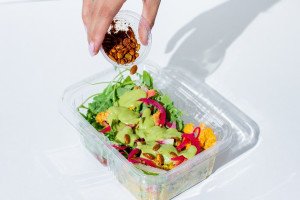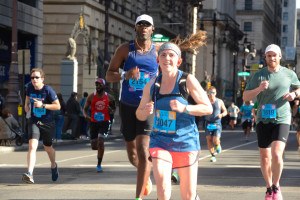Un-Scrooge Yourself: Why It’s Good for You to Give Back
As 2012 draws to a close (I know, when did that happen, right?) and you’re thinking about your end-of-year giving, consider this: giving back isn’t just a good thing to do—it’s good for you, too.
“Health-wise, giving has been shown to release brain chemicals and hormones like endorphins and oxytocin, which both promote positivity and euphoria,” says Alyson Nerenberg, a licensed psychologist in Chestnut Hill. “Basically, you’re getting a lot of positive feelings.” And those feelings come with an impressive list of domino effects: an act of giving can lower stress levels, improve mood, increase self-esteem, strengthen social ties, and even help you live longer.
Of course, if you’re giving of yourself you’re probably not in it for your own benefit, but knowing how it can boost your own health might just help you to give more often. Nerenberg encourages her clients to use this time of year to plan their giving for the year ahead. “Start by asking yourself , ‘What do I believe in? What can I do to make my place in the world feel better? What pratical causes am I committed to?'” she says. You can start small by supporting a friend in a charity run, volunteering one Saturday a month at a soup kitchen, or reading to kids at your local library. The idea is make your giving more intentional—you know, so you don’t find yourself at the end of the year frantically writing donation checks.
If you want to get on the horn and are looking for some deserving charities to get started, here are eight in the Philadelphia region doing good work. Read on for ways you can get involved.
The Food Trust
What it does: Yes, First Lady Michelle Obama is a well-documented Food Trust cheerleader, but she’s not the only one: the Philly organization, which aims to make healthy food affordable and accessible to everybody, has garnered lots of national attention recently with a mention the New York Times. Across the board, the message is the same: Philly is doing something right when it comes to tackling healthy-food deserts, and that’s in large part due to the innovative work of the Food Trust.
How to help: Donations to the Food Trust support farmers’ markets in low-income communities, school nutrition programs, supermarket development in underserved neighborhoods, Night Markets and much more. Volunteers are also needed for programs and events throughout the year.
Students Run Philly Style
What it does: We got to know Students Run Philly Style director and founder Heather McDanel pretty well this fall, when she made it to the finals of our first ever Health Hero Challenge. Through her organization—and with the help of staff and volunteers—she’s reached 2,500 students in Philly-area schools to help them accomplish goals they never imagined possible—including running a marathon. Students train with adult mentors three times a week from March to November, completing eight road races and learning about leadership, goal-setting and character development along the way.
How to help: You can donate funds in any amount to support Students Run Philly Style’s programming, but you can also sign up for the Sponsor a Student program, which links you to a specific student to whom your funds are directed. The $1,000 donation supplies running shoes and gear; covers race entry fees; provides meals, snacks and transpiration; and sends your student to the Leadership Summit conference, among other things. Volunteer mentors are also needed to run the training groups.
REQ 1
What it does: You may have already supported this NoLibs-based nonprofit and not even known it: it shares a space with our fave Pilates studio, Ploome, and funds from the studio help support REQ 1’s work. The organization works with victim-survivors of gender-based violence, helping them heal (mentally, physically) by providing space and programs for physical activity, self-expression and community connection.
How to help: You can sign up for a class at Ploome, donate gently used fitness clothing and art supplies to be used by REQ 1 participants, or make a financial contribution.
Alex’s Lemonade Stand
What it does: Did you know this national childhood-cancer foundation has local roots? Four-year-old cancer patient Alex Scott set the wheels in motion in 2000 when she set up shop in her front yard near Philly, selling lemonade to raise funds to help find a cure for childhood cancers. Alex died in 2004, but her legacy lives on in this nonprofit named for its very first fundraising effort: Alex’s Lemonade Stand. In a little more than a decade, the organization has raised $60 million and funded over 250 research projects aimed at finding cures for all childhood cancers.
How you can help: Volunteer at the organization’s Wynnewood HQ, help with special events or social media, become an ambassador, sign up for a run, bike ride or swim—the options are almost endless. Financial donations, car donations and more are also accepted.
Back On My Feet
What it does: Simply put, it gives running shoes to the homeless. But Back On My Feet does so much more: through organized group runs, homeless people gain strength, self-esteem and confidence as a means to self-sufficiency and independence. The organization launched here in 2007 and now has chapters in eight cities across the country, with more on the way.
How you can help: Attend an orientation session—details are on the website—then join one of six running groups at locations around the city. Financial contributions are also accepted to help cover the average $1,800-per-participant-per-year cost of BOMF programming, which includes financial assistance and career support.
Team in Training
What it does: Here’s another organization faithful Be Well readers are probably familiar with thanks to Health Hero Challenge finalist Stephen Brown. Team in Training is one of the Leukemia & Lymphoma Society’s most visible arms, a race-training program that helps participants get ready for triathlons, marathons and century bike rides, all while raising funds for LLS. To date, Team in Training athletes have raised over $1.2 billion to fight blood cancers.
How you can help: Sign up for a race! The local Eastern Pennsylvania Chapter organizes teams for major local races like the Broad Street Run and the TriRock Philadelphia Triathlon. You can also sponsor a participant or team.
MANNA
What it does: The Metropolitan Area Neighborhood Nutrition Alliance (better known as MANNA), prepares and delivers nutritious meals to people with life-threatening illnesses, with over 9.5 million meals delivered to date. What started as an AIDs-focused organization operating out of a church in the early 1990s has blossomed into nonprofit, nonsectarian powerhouse that now offers food delivery, nutrition-counseling services, and more to ill people with acute nutrition needs throughout the region.
How you can help: Volunteer to help prepare and pack meals, deliver them to clients, or help in the administrative offices or with a fundraising event. Cash donations help put nutritious meals on tables.
Prostate Health International
What it does: A division of the Foundation for Breast and Prostate Health, the Philly-based organization raises awareness about prostate cancer, funds research, and provides free screenings and a means for treatment for medically underserved men.
How you can help: Run the Gary Papa 5K on Father’s Day, a race named for 6ABC sportscaster Gary Papa, a PHI board member and prostate-cancer patient who lost his battle to the disease in 2009. Donations are also accepted.


